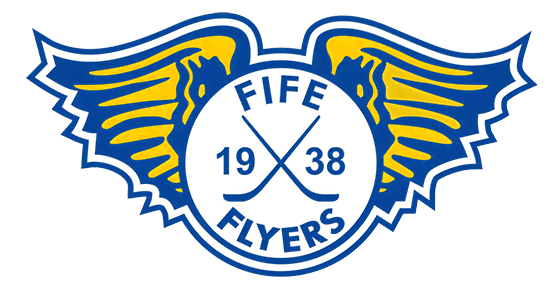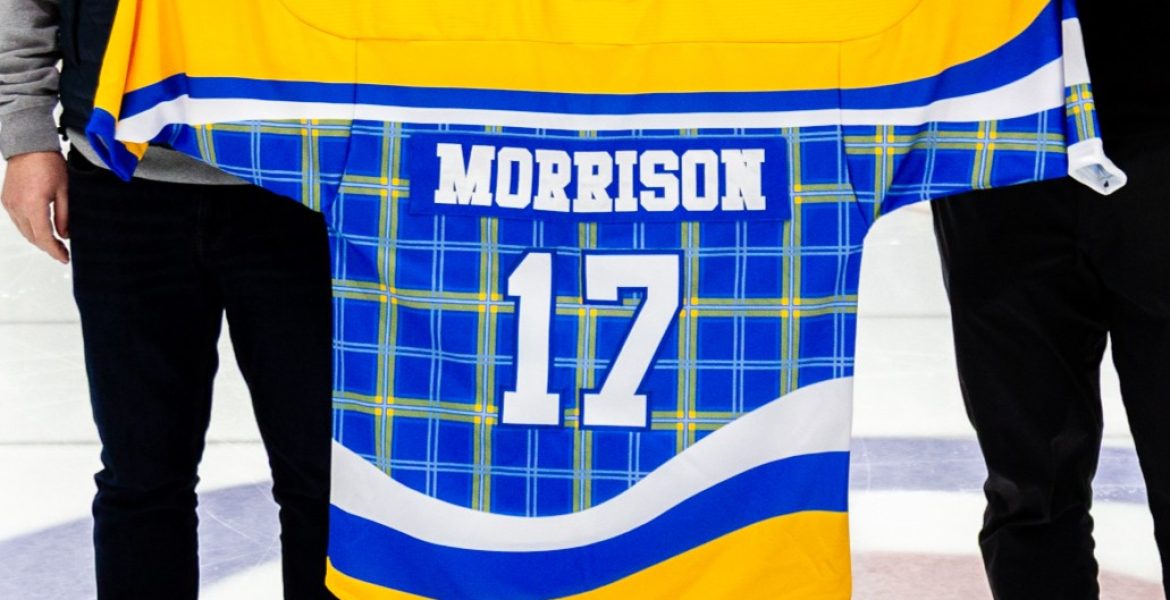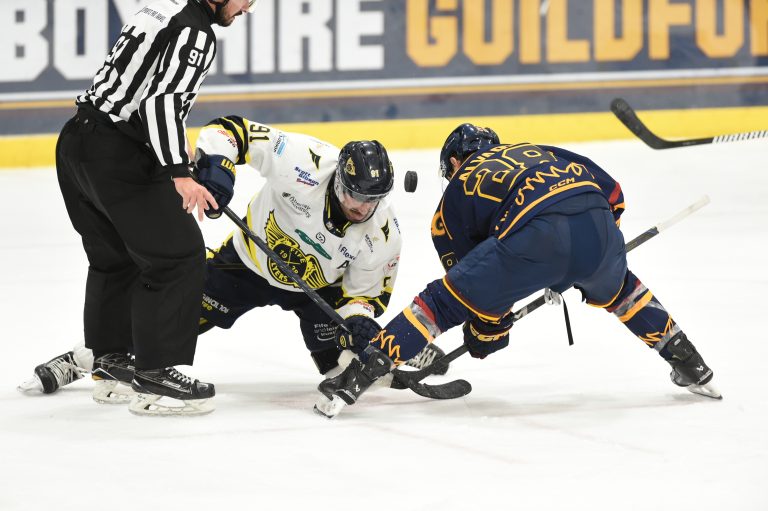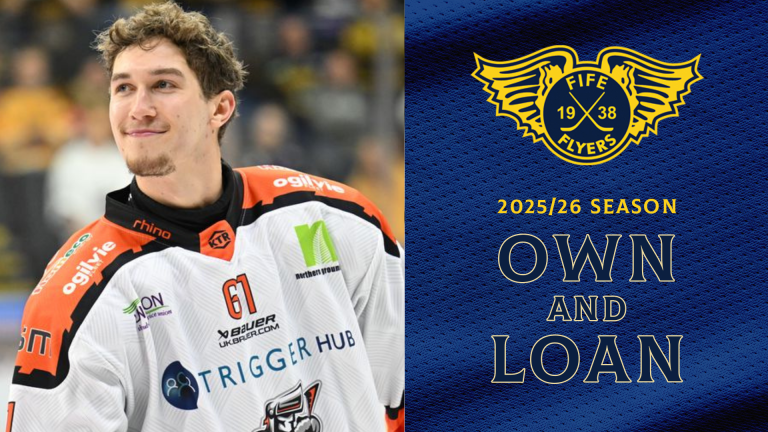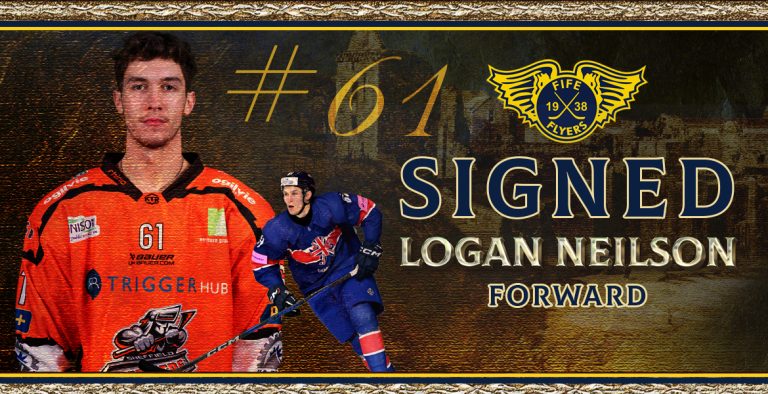Mark’s move in the summer of 1993 to the Fife Flyers almost never happened. He had returned home from Italy, and had no plans to head back … or even return to the ice. At the age of 29 all he was thinking about was hanging up his skates to settle down to life in Victoria but then Jim Lynch called. It took more than one phone call to talk him round. “The first time Jim phoned would probably be in July, and I kinda blew him off,” he said. “I really was uncertain about what I wanted to do. I’d just got back home and my wife had just finishing nursing school. I wasn’t certain I was finished with hockey but nothing was settled. Jim phoned again a couple of weeks later and he was pretty persuasive that this was a good place to play and to live. I guess my wife saw me moping round the house and told me to give it a shot.”
That summer the Flyers were assembling one of their most exciting and entertaining teams in years. They already had Doug Smail on board, the first player to come direct from the NHL to the UK and they needed a foil for his lightning speed. They found the perfect complement in Mark.
While Smail enjoyed the high profile, it was Morrison’s two-way play which set the tempo for the team and, after a sticky start, everything clicked. “I think we won in Nottingham and it just took off after that,” said Mark, “but early on we struggled as a team and there were meetings where we were told we had to win.” While Smail shattered the club’s short-handed goalscoring record, Morrison put up a points total that is to this day only behind that of Dave Stoyanovich and Richard LaPlante’s scoring exploits.
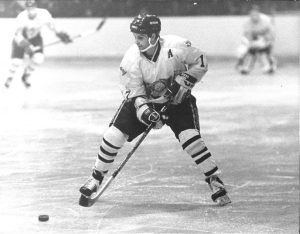
Off the ice he settled into life in Kinghorn, and took his first view of the old-style arena in his stride. “People kept saying ‘you gotta see this place’ but it wasn’t that bad! I grew up playing in buildings like Fife’s so it wasn’t really a culture shock to me. There are still lots of arenas like it in Canada. “For me the hardest thing to deal with was what I saw as negativity which surrounded the team. You’d score a hat-trick and fans would say “well done – but how did you miss that fourth one?”
We got to Wembley which was great, but folk said “but you lost”. Coming from Canada it was hard for Mark to figure that out at first. The fans were so close to the team and they lived and breathed the sport but it just took time getting used to their way and of course also understanding the accents. He said, “It wasn’t personal and once you realised that you could have a lot of fun playing hockey here.” And fun it was as Fife played in front of huge and appreciative crowds and posted some awesome results enroute to second place in the Premier League which was their best placing in the British League since the 1984-85 season. Champions Cardiff Devils were hammered 12-1, high-flying Whitley Warriors wilted 14-1 and the Durham Wasps were completely out-played in a rare 15-3 demolition.
On the road Fife won their first ever league game in Edinburgh — Doug Smail sinking a January 18 winner to spark of scenes of celebration normally associated with cup final wins. Flyers ended their silverware famine by claiming the Scottish Cup with a fantastic final win over Murrayfield and a season on from returning to the top flight league they qualified for the British Championship finals weekend at Wembley. It was the sort of stage tailor made for Smail and company. Hopes of success, however, floundered as they went down 9-5 to Cardiff in a game which Devils’ coach John Lawless accurately described as “a game of mistakes.” Fife started by conceding what was effectively an “own goal” as Ryan Kummu’s sent a pass past his own goalie in just 10 seconds and the Flyers then lost two short-handed goals to trail 6-3 after the opening period. At 4-2 down and short-handed the rink rose as Doug Smail went one-on-one only for the puck to bobble at the crucial moment. The chance, and hopes of a final place, were lost. Mark netted twice in that last game of the season and Cardiff went on to take the title with a 12-1 hammering of Sheffield Steelers.
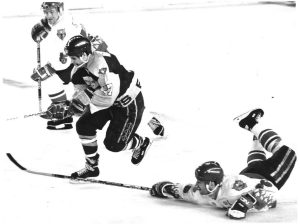
Despite Wembley it was still a fantastic season and one that fans still talk about with immense enthusiasm. “I had a lot of fun,” reflected Mark. “Playing with Doug was great. I knew of him from the NHL but we’d never played together before. “We seemed to complement each other’s style. It was a big ice surface and we were both fast skaters. I’m not saying I kept up with him but it seemed to work. “He was a great guy to play with. He never complained ‘why didn’t you pass’ or ‘didn’t you see me?, never. He was the first to apologise after a mistake and that made me feel comfortable playing next to him. “Guys like Doug have huge reputations back home and you do feel pressure playing with them. The way such partnerships work is they remove that weight and good hockey players know how to do that and to make their line-mates relax and enjoy themselves. They do it for a reason as hockey is a team game. They can’t win games on their own”.
If his first season in Fife had been eventful then what followed over the next few seasons also wrote a few new chapters in his hockey legacy as a whirlwind of change blew through Fife where he witnessed more changes than most imports in his time in Fife. During that time the club played in three different leagues, underwent a change of ownership and Mark also added the responsibility of coaching to his own playing career. Season 1994/95 saw Mark return to Fife, but Doug Smail depart, at least for the time being. In his place came Tony Szabo and playmaker Josh Boni but neither lasted the season. Indeed by the time thoughts had turned to the play-offs, Smail had juggled his business commitments and returned to a Fife top and this time he brought with him Laurie Boschman who was a veteran of 1,000 NHL games.
The decision to come back for a second season was based on an enjoyable first year. “I had fun,” said Mark. “The hockey was good and I liked the area although I missed my family. By the time the club wanted me back my wife had finished school and we were able to come across together. “The kids went to school in Kinghorn and settled in well.”
On the ice, year two wasn’t as successful. Injuries claimed a number of key players, including Mark who missed the play-offs with a broken thumb, thus ending hopes of a return to Wembley, and Ryan Kummu broke his jaw in training. The Scottish Cup was retained but sixth place in the league was viewed with disappointment. “It wasn’t the greatest of seasons” added Mark. “We were pretty unsettled on the ice and losing Smail hurt us a lot.”
The changes continued in the summer of 1995 as Jim Lynch stood down and Ron Plumb returned. Ron was the man who masterminded the club’s memorable 1985 Championship win. He received a standing ovation on his first night but the return ended up being bitter-sweet. It was clear that the team who had new signings Chris Palmer and Frank Morris from Murrayfield was not firing on all cylinders. Five straight wins in a weak Benson & Hedges Cup qualifying section could not hide the fact that Fife were under-performing.
As the weeks went on, it was noticeable to most observers that Mark started to move further along the bench. In between shifts he could be seen leaning over the barriers just in front of the Zamboni, watching, analysing and ultimately coaching. Four days before the televised B&H Cup semi-final against Sheffield Steelers which created the legendary “Braveheart Game” where the rink was awash with tartan scarves and Scottish flags he was handed the baton.
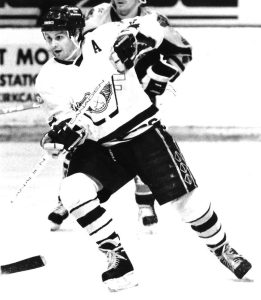
Looking back, he admitted: “We were struggling. It was mid-season and things were not going well. The fans were starting to boo the team and that’s wrong “After Ron’s dismissal I was offered the job and I figured that someone had to do something. Things had changed from the time Ronnie was here in ’85. It was no longer a case of teams playing three imports. It had turned into a much greater team game. To motivate the guys simply wasn’t enough anymore. You had to function as a team and we weren’t doing that.”
In his first programme notes, Mark described the new appointment as “a huge step” but one which he viewed positively, and he promised a team that would play “with a lot of enthusiasm and that would work hard over 60 minutes.”
A fired-up Flyers duly won the first leg 5-3 with Morrison netting 2+2 only to lose the tie 6-3 in overtime in Sheffield. The games were described by Powerplay as “the most thrilling in the history of the competition.” Further team changes were made with Scott Plews and Les Millie brought back from Telford and Sheffield respectively while firecracker forward Kevin St Jacques set the building alight and new import defenceman Frank Evans made a huge contribution to defence. Overall Flyers finished sixth in an increasingly import-dominated league and along the way also had the satisfaction of shattering Cardiff’s title hopes with a 6-5 home win. The play-offs brought new hope but a first night 5-4 loss in Nottingham followed by an 11-0 home shellacking against Sheffield marked the beginning of the end. “I thought we were very unlucky not to make the B & H final that year, ” said Mark. “We brought in some players and one of our big minuses was the broken ankle which cost us Les Millie. He was scoring huge goals for us and we needed him, we needed everyone. We had just enough to get by on and his injury was a big loss.” Overall, however, Mark was happy with his first spell as player-coach. “I enjoyed it,” said Mark. “I felt it could be a successful move for me”
Season 1996/97 was Mark’s first full season in charge of the Flyers as player-coach and following a summer of fraction within UK hockey the British League, which had been the top-flight ice hockey league since 1982, was replaced by the Ice Hockey Superleague and the British National League.
The Flyers moved into the Northern Premier League which was one of two sections in the newly formed British National League but hopes of a cross-over competition with the southern section teams failed to materialise and so Fife were left to go it alone in a radically different structure. While the big guns such as Sheffield and Cardiff moved out to the Super League in came a revived Paisley Pirates, Dumfries Vikings and Irish outfit Castlereagh Knights.
There was also a new look to the Fife bench as a number of rookies were called-up and given their chance at senior hockey. Players such as Kyle Home, John Reid and Wayne Maxwell along with the support of a core of seniors who included netminder Martin McKay, Gordon Latto and Steven King. Fife won the league with ease. Only Paisley put up any resistance and sparks often flew when the great east-west rivals met, much to the delight of the huge crowds.
The Flyers put together 14 straight wins and remained unbeaten on home ice for five months, underlining the feel-good factor surrounding the club after its mid-summer change of ownership. Crowds rose on the back of major work within the schools with much of it done by Mark and the players. The standard of hockey may not have been comparable to the now defunct Premier League but it was a successful holding operation until hockey, north and south, could reunite. Which it never has to this very day. Mark admitted: “From a playing point of view it wasn’t the toughest challenge. Paisley were competitive and we had some good games against them but that was really about it. “But that gave me a chance to be a coach and give a lot of young guys decent ice time and that enabled them to improve.”
Fife won the title with a stunning 33-3-0 record and finished some 14 points clear of Paisley, scoring 315 goals and conceding just 30 in the process. Mark was the league’s top scorer, McKay its leading netminder which was perfect way to bring the curtain down on his career. The campaign also produced two thrashing of the hapless Castlereagh, home and away.
While the goals mounted up the Flyers’ target remained the British Championship final at the Nynex Arena in Manchester and a tilt at the southern title winners to determine the Champion of Champions. The showdown with Swindon IceLords saw 1,000 Fife fans head south to Manchester, a figure which put some Superleague sides to shame. The 5-0 defeat summed up the gulf between the teams. Fife iced three imports whilst the Icelords had 10 on their bankrolled dream team. They won the cup and promptly folded before the launch of a unified British National league in the summer of 1997.
Again there were budget differences between the North and South in that inaugural 1997/1998 season but Flyers still beat everyone within the BNL to take sixth spot as well as a second successive NPL crown in the regional league which ran parallel to the main competition. It was the club’s first back to back league Championships for exactly 20 years. From that point the BNL then went from strength to strength. Standards had risen, top quality players returned and the Flyers continued their run of silverware every single season under Mark. “The league improved every year,” admitted Mark, “and as it got better it presented new challenges.”
When penning a history of the Fife Flyers, seasons 1998/1999 and 1999/2000 will be more than fondly remembered as watershed campaigns. Back to back British Championship triumphs took the club to unprecedented success. Just as the Wembley winners of 1985 have been immortalised in history so too the players who stormed to two play-off crowns” and topping that off with a BNL Grand Slam. For Mark the silverware marked the culmination of several seasons of hard work but his own memories would be bitter-sweet. Hull ’99 saw unbelievable scenes of celebration on and off the ice as he was forced to watch from the sidelines.
His season ended on the eve of the play-offs with a broken ankle and while he was very much a part of the weekend. The manner in which he plotted every move of the semi-final against Guildford from the bench was astonishing to watch but it simply wasn’t the same. “Hull was real frustrating for me.” he said. “I didn’t get to play in the final and there wasn’t the same feeling to winning as a coach as there is to winning as a player.” There was however, the consolation of steering the club to its first Champions crown since 1985 and doing so in a style which earned plaudits the length and breadth of the league.
The entire arena united behind Fife as they freewheeled and played some of the most open, entertaining and skillful hockey seen in a British final. The semi-final against Flames which Fife won 4-3 was hailed as a classic but it paled against the drama of the final. Flyers roared into a 4-1 lead against a big hitting and hard checking Slough Jets, only to be pulled back in the closing minutes. Overtime couldn’t separate the teams and so it was on to sudden death penalty shots. John Coyle netting first and then Joe Watkins blocking Derek Higdon’s shot at the other end of the pad to signal the start of the celebrations.
It was, as Mark said at the time “just perfect Fife hockey, all precision passing and then bang! bang! bang!” The players were the first to praise their coach, with John Haig crediting Mark with the win, pointing out: “Coaching is a big factor in the league with the teams being so close. Mark is first class.” Later, as the party returned home and the cup was paraded round the arena then on to Kitty McGuinty’s via a team dinner the coach mused: “British champions. I like the sound of that.”
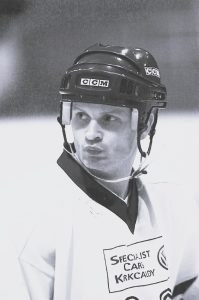
While many fans thought the best had come in fact the title triumph was merely the launch pad for an explosive 1999/2000 campaign which was to yield a league title, the Christmas Cup, Scottish Cup, and a successful defence of their Championship crown in the first ever best-of-five final against the Basingstoke Bison. From February through until early April Flyers barely put a skate wrong as they powered through a punishing schedule and soaked up the big games. It culminated in the best-of series against Bison which Flyers swept 3-0. A 6-3 first night win was inspired by a Morrison hat-trick and it was followed by successive 2-1 victories to claim the silverware. If you asked Mark to choose his ultimate memory of his eight seasons in Kirkcaldy he’d narrow it down to this: “The last minute and a half of the last game against Basingstoke. Finally after all that time it came together and we were able to win the Championship on our own ice, in our own building and in front of our own fans. That’s pretty special.” It was a really tight series. We did well to win the first game by a couple of goals but then it went 2-1 which is the sign of a good hockey game. But winning on home ice, that’s what I wanted to do so that every single fan had the chance to come and see us win it.” For Mark the win was extra-special having missed out as a player at Hull 12 months earlier, and it was not insignificant that he was the last player to leave the ice pad after spending almost 45 minutes skating round and signing autographs, speaking to fans and posing for pictures.
He made that last minute and a half last as long as possible before returning to the dressing-room to begin the celebrations.
For the first time in the BNL the Flyers were topped in the attendance chart despite a small increase for the 2000/01 Season as the Guildford were now marginally bigger drawers. Unsurprisingly Fife returned all but one of their imports from the Slam season, Moody deciding to ‘hang em up’ but more importantly perhaps was the loss of the Haig and Smith double act to Guildford. The Flyers topped their Benson and Hedges Cup group, then got whacked by ISL Newcastle Jesters. The league however was effectively lost early on as Flyers struggled to pick up points on the road and eventually they finished 3rd four points behind the Flames despite Dutiaume and Monteith top scoring in the league. Craig Nelson and Bill Morrison had arrived mid-season from Paisley.
In the Christmas Cup they qualified out of the group and ‘smoked’ the Peterborough Pirates in a second leg come back to reach the Final. The Flames won both legs. In the playoffs there was disappointment as they finished third in their group to be eliminated. There was the by now annual presentation of the Scottish Cup after a win against the Edinburgh Capitals.
Season 2001/02 saw the BNL also increased with Dundee Stars (eventual winners) and Cardiff Devils joining. Morris, Dutiaume, Morrison, Monteith for his final season all returned. There was a new man behind the mask in import Shawn Silver and the arrival of the hugely popular Karry Biette from the Flames. There was an end to the ludicrous Benson and Hedges start of season tournament and this was replaced by the Findus Challenge Cup. Flyers were perfect in their six group games and progressed to the Nottingham Arena for a finals weekend in November. Peterborough Pirates were hammered 10-2 in the semi and a Karry Biette hat trick helped the Flyers lift the trophy in a 6-3 win against the Coventry Blaze. It was another 3rd place finish in the league as Dundee Stars ran away with the title. Qualification from the playoff group stage was achieved by Fife ran up against the red hot Stars who sent them out at the semi final stage as well as annexing the Scottish Cup from them.
Season 2002/03 saw both John Haig and Davie Smith reunite the famous partnership at Fife. Steve Briere entertained in net and high fived his way around the rink at the end of every game. Mike Bishop, Jeff Trembecky and Scott Campbell just about stayed long enough to taste the stovies and many thought Steve Roberts overstayed his nine games before being cut. The BNL lost teams in Slough, Paisley, and Peterborough but gained Newcastle and Milton Keynes becoming Solihull MK. It was however somewhat of another disappointing season. Fife finished 7th in the 10 team league to make the playoffs but picked up only one post season win from six. The Scottish Cup or Caledonia Cup did return after a 9-7 aggregate win over Dundee Stars in the Final that season.
The 2003/04 season saw Flyers collect both the British National League and Caledonia Cup. Ian Fletcher and another fan favourite Greg Kuznik were recruited on the blueline and to bolster the returning trio of Biette, Morrison and Dutiaume was the mercurial Dan Goneau and no nonsense Paul Spadafora. It was a mixture of sublime skill and grit that worked and the BNL title was won after a very close race with Fife beating Guildford to top spot by only 1 point. However the league was starting its demises with only 7 teams competing. It meant that Hull were dropped as last placed team from the playoffs and 6 played a mini league to see who qualified for the semi. Fife finished 2nd and matched up against Bracknell who won both legs. The Caledonia Cup was retained again after victory against the Edinburgh Capitals.
The 2004/05 Season as it turned out was the final season of the BNL. The EIHL which was going into its second season following the collapse of the ISL played some crossover games with the BNL teams. The BNL iced 8 imports and the EIHL teams iced 12. Fife recorded 3 wins and an OTL in the 14 games played. The game had struggled with these inequalities since the inception of the ISL and the ridiculous Benson and Hedges competition. Briere was back then replaced by Scott Hay. Adrian Saul added from Murrayfield whilst newcomers Judd Medak and Kent Davyduke failed to live up to expectations. In truth though it was a season where Fife played the majority of their games without a full import quota due to injuries on their way to a 6th place finish. They got some of their mojo back to qualify from the playoff group and in the best of three semi against the Guildford Flames. The teams split the first two games and the decider on 31st March would end up being the final game that Mark was involved in for the Flyers.
“Knocked out by a weaker team”. That was the analysis of the Flyers coach after his side crashed out of the Championship play-offs in game three of the semi-final in Guildford. Morrison believed that had he not suffered a broken leg in the first match a week earlier, it would have been the Flyers and not Flames who were competing the final against Dundee. “There was no doubt in my mind that we had a better team than Guildford,” he said in what would be his final ever post-match press conference. “We out-shot and out-chanced them but injuries cost us once again. It’s been a factor for us all year long and even right down to the last game. “I don’t want to say that my injury was the sole cause for losing but it put too much stress on the three defencemen we had left.” Flyers appeared to have the upper hand in the tie after a 3-1 first leg win in Guildford. However, the win came at a huge cost as Morrison suffered a spiral leg break leaving a huge gap on Flyers bench. The Kirkcaldy side were still hopeful of winning the home tie to progress to the final but, despite taking the lead, a third period collapse saw Guildford emerge 3-1 winners to set up the all or nothing decider at the Spectrum. Flyers again stormed into the lead but up against Guildford’s three lines, Flyers tired and despite an enormous effort the Fifers eventually succumbed to defeat. “We were up 2-1 down there and playing well but we didn’t have the bodies in defence,” reflected Morrison.
That’s where our offence begins but in the third period they had nothing left. We were all over them but we just couldn’t maintain it. But I’m proud of my players and the way they battled, I’m just disappointed the way things worked out.” Flyers had suffered a horrendous run of injuries in a season that had seen them lose the services of Karry Biette and Dreu Volk while others such as Todd Dutiaume and Derek King had also been on the shelf for a spell. It was a trend repeated across the league and Morrison believed that players were being asked to do too much. “Injuries have hampered us throughout the year and I’m not sure if that is coincidental or a result of playing too many hockey games with too few players,” he said. “The more you are asked to go on the ice the greater the chance of getting injured. We are having to ask guys to play 45 minutes a night right through the season and every team in the league is affected at some point. Dundee had their injury crisis at the start when they were turning up for games with eight or nine players. It used to be about the talent pool but now it’s more about the number of bodies you have. It’s frustrating because we played some good hockey but didn’t win anything, injuries killed us.”
Mark’s return to Canada following the season was delayed awaiting clearance from a GP for him to fly back to Vancouver Island to continue his recuperation from his injury. As he headed out of town he gave his thoughts on the uncertain times as he hinted that his wish was to see the club join British ice hockey’s heavyweights in the Elite League. The 41-year-old admitted that he was desperate to return as player-coach but that that would depend on which league Flyers found themselves in next season with the fragile BNL on its knees after Edinburgh and Newcastle quit for the Elite League. “I’m not setting any ultimatums, but if Fife were to stay in the BNL and it wasn’t a formidable league then that would make up my mind,” he revealed. “It’s not the way I would want things to end for me and it would be a real downer if it were to happen. I’ve taken this club year by year for the past 13 years and although we’ve achieved a lot, there is still more to be done. We should be competing with the best hockey clubs Britain has to offer but things are looking a little shaky right now.” He had previously expressed his concerns regarding the superior depth of the Elite sides but felt that this could be overcome when he said; “It would be an exciting challenge. We could keep the same import count and go with a few more full-time British professionals. A lot is made of the number of Brits in the Elite League but the British guys that I saw in those teams were playing every week on the third and some-times the second line. I think that everyone realised the buzz and special atmosphere that can be created when teams like Sheffield, Belfast and Nottingham come to the rink.
That summer was another tumultuous time for the club who sought a safe haven following the demise of the BNL. Entry into the Elite Ice Hockey League was not forthcoming and the continuation of hockey in the town was only secured with the team dropping down into the Scottish National League and a newly formed Northern League competition. The landscape looked very different with the league consisting essentially of part time local players and so the a potential return to Kirkcaldy for a 13th term for Mark was quashed.


